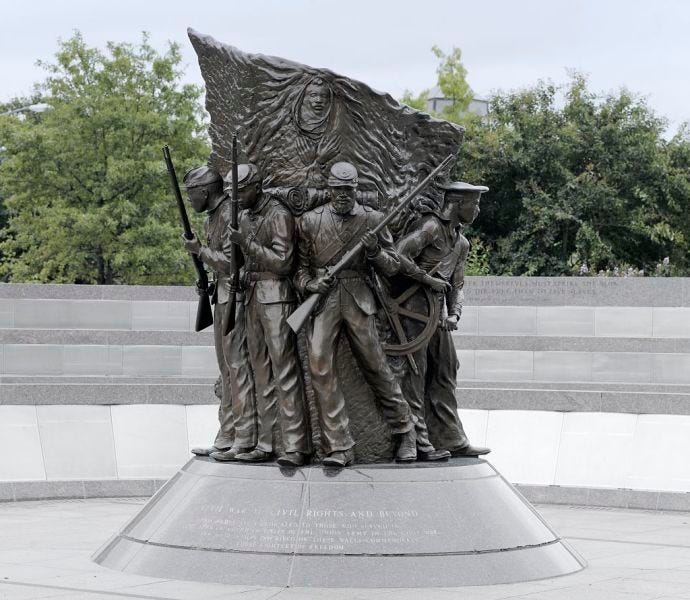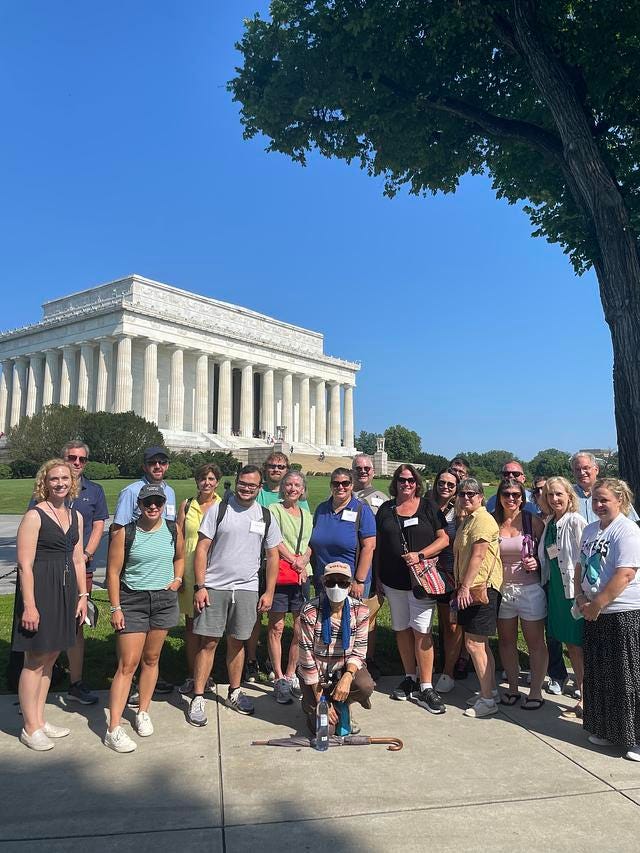Yesterday the Fords Theatre teacher workshop participants stopped at the African American Civil War Memorial, along U Street, in the historic Shaw Neighborhood of Washington, D.C. We discussed the importance of the memorial in relationship to the broader Civil War memorial landscape and the number of monuments/statues that depict Black Civil War soldiers.
In years past, the area around the memorial has been quiet, but yesterday we walked into a boisterous and vibrant neighborhood festival. One of our participants ended up talking with an African-American woman who was wondering what a group of predominantly white people was doing at the memorial. Perhaps it was her first time seeing such a group of teachers in this particular location.
Today during our last group conversation we had a chance to unpack that encounter. The woman specifically wanted to know what our teachers were going to do with this information about the African American memorial and related stories and what we can do to get this information into schools that can’t afford to send teachers to professional development workshops or purchase the latest books and other resources for students.
Our teachers return home with a strong sense of responsibility to find ways to bring this rich and exhausting 5-day experience back to their respective school communities. But even more significantly, I think they have a clearer understanding of the role that memory plays in shaping the curriculum, including whose stores get told and whose stories get pushed to the side and how this evolving narrative reflects current racial and social inequities.
Most of these teachers are painfully aware of the broader national conversation about history education and the ongoing attempts to vilify them and censor what they teach about some of the most important subjects in the curriculum. They’ve seen their fellow teachers leave the profession and the challenges their schools face in convincing younger people to consider teaching as a profession.
And yet these people chose to spend part of a much deserved vacation learning more and trying to find ways to inspire their students with a love and curiosity for history.
During our final conversation earlier today—with the help of historians Hilary Green and Kate Masur—teachers reflected on the importance of finding ways to introduce new voices to their students. Others expressed a commitment to exploring their own local monument landscapes while others hope to introduce their students to the concept of memory and how it applies to current debates about the past.
Not a single teacher brought up Critical Race Theory. We didn’t debate the merits between framing history around 1619 v. 1776 or whether our nation was “stamped from the beginning.” We focused on the complexity of the history of Reconstruction and Jim Crow and how a broader historical narrative might be framed around the themes of resiliency, hope, opportunity, and struggle.
No one thought we needed to reject our nation’s “founding” documents and the ideals expressed therein. Quite the contrary. What we focused on this past week is the way that various groups of Americans, especially African Americans, appropriated and helped to make meaning of these ideals.
I am walking away from this workshop inspired and committed to continuing my work with history educators. Most importantly, I am optimistic for the future knowing that there are tens of thousands of educators just like the ones I met this week who will soon head back into the classroom.
This is the face of history educators across the country
I want you to remember this post and this photograph next time an elected official or anyone accuses history teachers of trying to corrupt their students in some way or that they are collectively engaging in some other form of nefarious behavior.
The individuals in this photograph are not asking for much from their respective communities. All they want is your trust, respect and support.
They deserve it.






A great post, Kevin! Keep 'em comin', says a retired History teacher from Georgia. I took several such summer vacation opportunities to broaden my knowledge of History during nearly forty years in a high school classroom, but I was too early for you--my loss I'm guessin'. . . .
This is splendid. I majored in history because of a history teacher and almost became one myself. I still read it and have a library filled with American history and theology, Biblical studies, church history, and counseling. But my first love is American history and it was history teachers who saw my love for history and nurtured it.